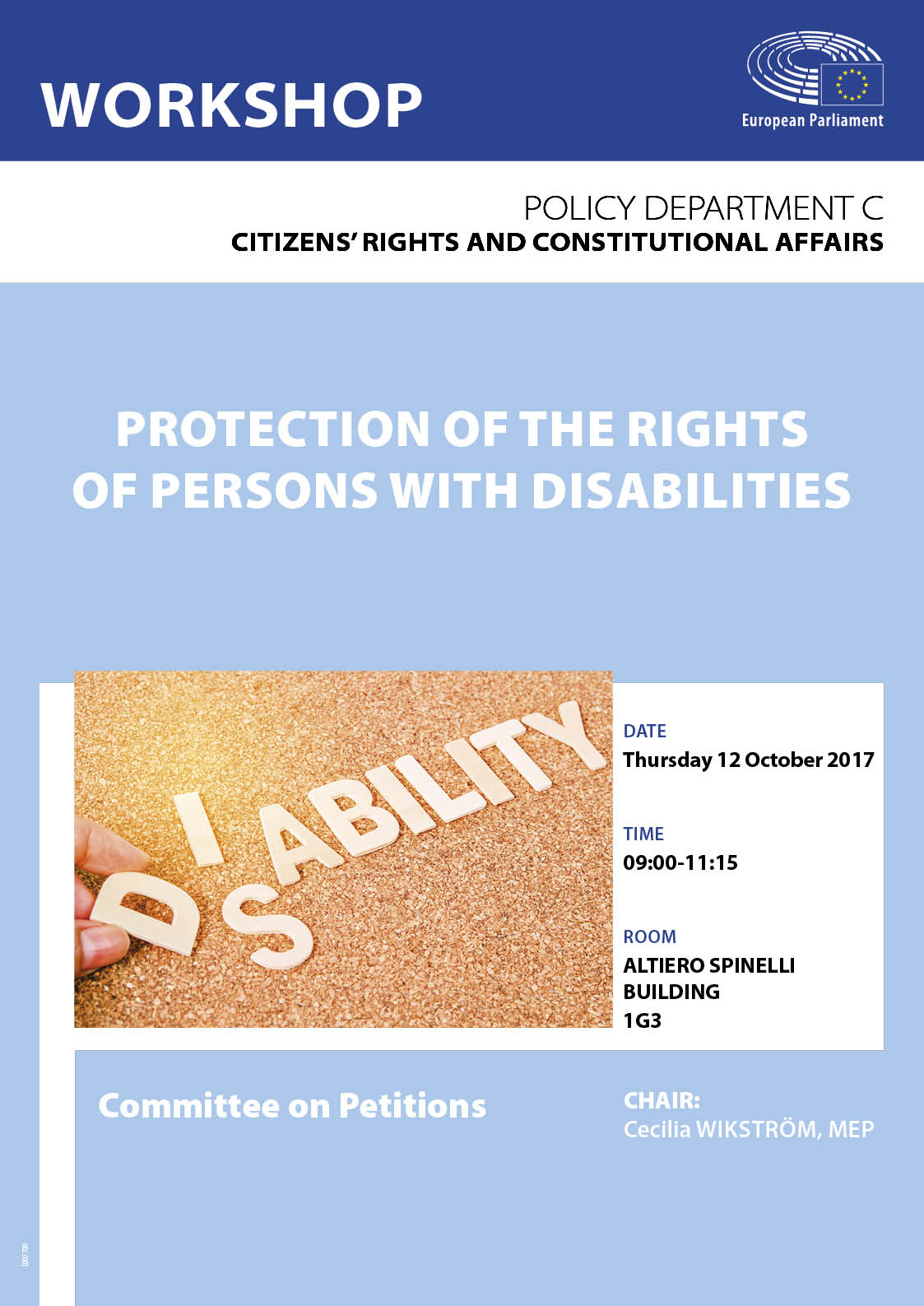Click here for the easy-to-read version
“What are you willing to do to create a more inclusive society?”
This was the question that Inclusion Europe’s Policy Officer Guillaume Jacquinot raised on October 12th speaking at a workshop at the European Parliament. The workshop was on the Protection of Rights of People with Disabilities and was organised by the Policy Department for Citizens´ Rights and Constitutional Affairs for the Committee on Petitions.
The workshop consisted of experts speaking about a variety of issues that affect people with disabilities and the role of the EU in improving the situation. Among the speeches, central themes emerged including the denial of the right to make decisions about own life (denial of legal capacity), the need for accessible information, the need to end segregation (deinstitutionalisation), and the inclusion of people with disabilities in decision-making.
“What is love?”
Guillaume Jacquinot started his speech with the question, “what is love?”. This is the question a judge asked a man with an intellectual disability when determining whether or not he could get married. This question offers insight into the discrimination that people with intellectual disabilities face when denied the right to make decision about their own life.
Guillaume Jacquinot highlighted how Inclusion Europe tackles discrimination and empowers people with intellectual disabilities in their decision-making. He emphasised recent leadership training, Europe for Us newsletter, and upcoming Hear Our Voices conference as examples of the ways Inclusion Europe empowers people with intellectual disabilities.
Guillaume Jacquinot also stressed the role of the European Union in ensuring the rights of people with disabilities, stating:
“The EU should be more ambitious in its disability strategy. It means including clear targets on closing institutions. It means recognising the deprivation of legal capacity areas as a key issue that needs to be addressed, as it impacts all areas of life”.
Many of the sentiments of Guillaume Jacquinot and Inclusion Europe were echoed by other speakers.
Zara Todd, Director of ENIL, gave an impassioned speech on deinstitutionalisation pointing out that people with disabilities are not being allowed to make decisions about their own lives because of the lack of accessible information. Zara Todd also pointed to the complex legal mechanisms that surround independent living for people with disabilities stating,
persons with disabilities need a law degree to know where they can find support and legal protection.
“Women with disabilities are three times more likely to be victims of violence”
An-Sofie Leenknecht, the Human-Rights Coordinator at the European Disability Forum, spoke about the topic of legal capacity. She talked about how the deprivation of legal capacity can lead to forced sterilization as well as violence against women and girls with disabilities. An-Sofie Leenknecht also shared the statistic that, “women with disabilities are three times more likely to be victims of violence”
“The European Union should lead by example on web accessibility”.
Koen Roovers spoke on behalf of the office of the European Ombudsman, he addressed the need for accessible information. Roovers said that “the European Union should lead by example on web accessibility”. Inmaculada Placencia Porrero, Senior Expert on Disability and Inclusion, from the EU Commission also raised the need for accessible information saying people with disabilities often lack knowledge about their rights.
The speakers at the workshop talked about many critical issues surrounding the rights of people with disabilities. It was a good opportunity for civil society to engage with public institutions.
Inclusion Europe welcomes more opportunities to engage with Members of the European Parliament on the rights of people with disabilities.
The PETI Committee met to talk about petitions received from European citizens with an intellectual disability. They were complaining about the lack of accessibility and its effects on their lives. One of them was he fined for non-respect of regulations that he could not understand because not delivered in easy-to-read format.
After discussion on petitions, The PETI Committee expresses recommendations to assist the EP on disability issues in its protection role. The PETI Committee plays an important to role in the implementation of the Convention by the EU Institutions.
Easy-to-read version
Click on a word which is in bold to read what it means.
What are you willing to do to make society include everyone?
Guillaume Jacquinot asked this question at the European Parliament.
Guillaume Jacquinot is Inclusion Europe’s Policy Officer.
Guillaume Jacquinot was at the European Parliament
to talk at a workshop about the protection of rights
of people with disabilities.
The workshop was organised by the Committee on Petitions.
The Committee on Petitions lets people write
to the European Union about their complaints.
The workshop had lots of speakers talking
about the rights of people with disabilities.
The speakers talked about lots of different topics
that affect people with disabilities.
Guillaume Jacquinot started off his speech by asking a question.
His question was “what is love?”
Guillaume Jacquinot said this because this is what a judge asked a man
with an intellectual disability who wanted to get married.
It is not right to ask this question to people who want to get married.
No one can really answer this question.
Love means different things to different people.
Guillaume Jacquinot talked about how Inclusion Europe
tries to stop discrimination against people with disabilities.
Guillaume Jacquinot also talked about how Inclusion Europe helps
people with intellectual disabilities to get their voices heard.
He talked about Inclusion Europe’s leadership training,
the Europe for Us newsletter, and the Hear Our Voices event.
Guillaume Jacquinot also talked about how important it is
that the European Union works for equality for people with disabilities.
He says that the European Union needs to close institutions
and make sure everyone has full legal capacity.
Zara Todd also spoke at the workshop.
Zara Todd is the director of ENIL.
ENIL is the European Network of Independent Living.
Zara Todd talked about deinstitutionalisation.
Zara Todd also talked about how people with disabilities
are not being allowed to make decisions about their own life
because of a lack of accessible information.
Zara Todd said it is very hard for people with disabilities
to know their rights.
An-Sofie Leenknecht also spoke at the workshop.
An-Sofie Leenknecht works at the European Disability Forum.
An-Sofie Leenknecht talked about legal capacity.
An-Sofie Leenknecht talked about how not letting women
have full legal capacity means that bad things
can happen to women.
An-Sofie Leenknecht talked about how women with disabilities
are three times more likely to be victims of violence
than women without disabilities.
Koen Roovers also spoke at the workshop.
Koen Roovers works for the office of the European Ombudsman.
The European Ombudsman looks at complaints
about the European Union.
Koen Roovers said that the European Union should make sure
their website and information is accessible for people with disabilities.
Inmaculada Placencia Porrero also spoke at the workshop.
Inmaculada Placencia Porrero works for the European Commission.
She talked about accessible information.
The speakers at the workshop talked about lots of issues
that affect people with disabilities.
After the workshop, the Committee on Petitions discussed
two petitions that were submitted about people with disabilities.
Inclusion Europe welcomes these kinds of meetings where we can talk
with members of the European Parliament about people with disabilities.








